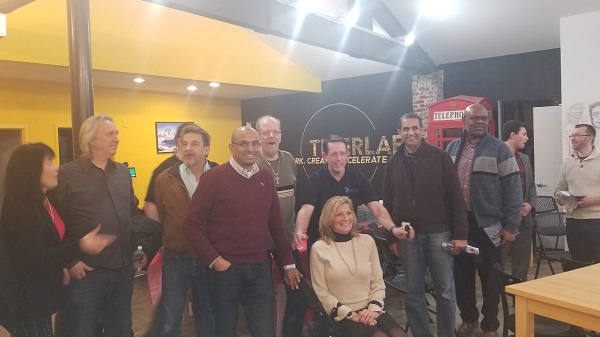Henry’s Take: Princeton Blockchain Meetup, Digital Identities, and a Cool CEO Named Ed Zabar
On February 27, I attended the Blockchain & AI Princeton Meetup. The main event was a presentation by Ed Zabar, founder and CEO of Verif-y (Philadelphia), about blockchain-based digital identities, challenges and opportunities.
Verif-y is a technology company that offers a new breed of identity, compliance and credentialing solutions to organizations and individuals around the world. According to the Meetup page for the event, “Verif-y‘s solutions are designed to give the user unparalleled control over their own identity documents, professional certifications, accreditations, education verifications and much more.”
Frankly, this description doesn’t do Verif-y or, more importantly, Ed Zabar’s vision any justice. OK, I must admit that I arrived at the event thinking of Verif-y as yet another identity-management blockchain company waving the flag of freedom against evil overlords like Facebook. I was wrong.
Before the presentation, I had a chance to sit down with Ed for about 15 minutes to discuss his vision, and what Verif-y really represented. I immediately realized that Ed was not a blockchain “take it to the Man!” fundamentalist. First and foremost, he is a businessman and a visionary who sees an opportunity to help companies overcome the complexities of complying with various state laws concerning personal data.
As soon as we started speaking, I immediately liked him. He has a dry, self-deprecating sense of humor and a very quick mind, but that’s not why I liked him. I liked him because of his direct, no-B.S. communication style.
For example, when speaking about the competitors, he did not fall into the feature/function trap. He simply said that he had read their white papers, and found them nonsensical. In one sentence, he not only sidelined the competition, but also made clear that he had taken the time to understand the competition.

At one point in his presentation, a blockchain advocate exclaimed that Verif-y isn’t needed because MIT professor Tim Berners-Lee is working on the Solid project (for “social linked data”), which will effectively render Verif-y obsolete. Without missing a beat, Ed said that he would be the first to support it, if and when it ever really happens. His own technology is designed to adapt to the future, and not go the way of the dodo bird (more on that later). Furthermore, he is more focused, not only on the future, but also on the present. We are getting hacked and attacked everyday. What are we doing now?
From Ed’s perspective, blockchain is, at its core, a distributed ledger database that’s well positioned on the security front to handle private and sensitive data. He is the first to admit that quantum computers can break the encryption; if and when that happens, we’ll have bigger problems.
From my perspective, it seems that Ed wants companies to off-load all of their proprietary user data that can be hacked onto Verif-y, effectively supporting all past and future privacy laws. By not holding onto their data, these companies are effectively in compliance. Think of it as taking all of the cash from under your mattress and putting it into a bank. The idea is to transfer the risk to somebody you can trust in order to mitigate your own risk. Are you feeling confident that you can support all the complicated issues related to compliance?
I think that Verif-y demands consideration, not only because of what it offers, but also due to its leadership. To illustrate this point further, Ed spoke about the Equifax data breach. The extent of the damage is unimaginable. There is a reason why we still don’t see the hacked data out there yet. Ed thinks the government of China or some other international actor is still sitting on it. Ed does not seem to be a conspiracy theorist; he simply understands the business. Today, Verif-y is focused on the financial services industry, probably because Ed comes from that background. However, the technology is applicable to any industry.
OK, enough about Ed. What exactly is Verif-y again? Simply put, Verif-y offers a multilayered enterprise platform that authenticates users’ identities without viewing or storing their personal data. It renders the European Union’s General Data Protection Regulation (GDPR), the California Consumer Privacy Act (CCPA), U.S. Consumer Online Privacy Rights Act (COPRA), and the U.S. Health Insurance Portability and Accountability Act (HIPAA) largely unnecessary. It also happens to use distributed ledger technology to store all the data. Ed gave a great example of that concept: Imagine your personal data is a huge puzzle, and all of the pieces are distributed across millions of computers all over the world. How much computing power would it take to gather all of your information together? How much did it take to hack Equifax? You get the picture.
I have said this before: The evolution of blockchain parallels the evolution of the internet. Over 25 years ago, I did a presentation to 600 people at Merrill Lynch, hitting the stage just after Lee. As a 26-year-old, I did not think much of it. To me, he was just another speaker. Now he’s working on Solid and, of course, I would like to think that I am older and wiser. The rise of the internet age has left a lot of skeletons (and dodo birds) by the side of the road. I am happy to see that there are people like Ed Zabar and companies like Verif-y to help us make business sense out of the blockchain era, even though he hardly mentions the word on his website. Why should he? Let him worry about it; all you need to worry about is making sure your customer data is safe. This last point is no longer a “want to have,” but a “need to have.”




